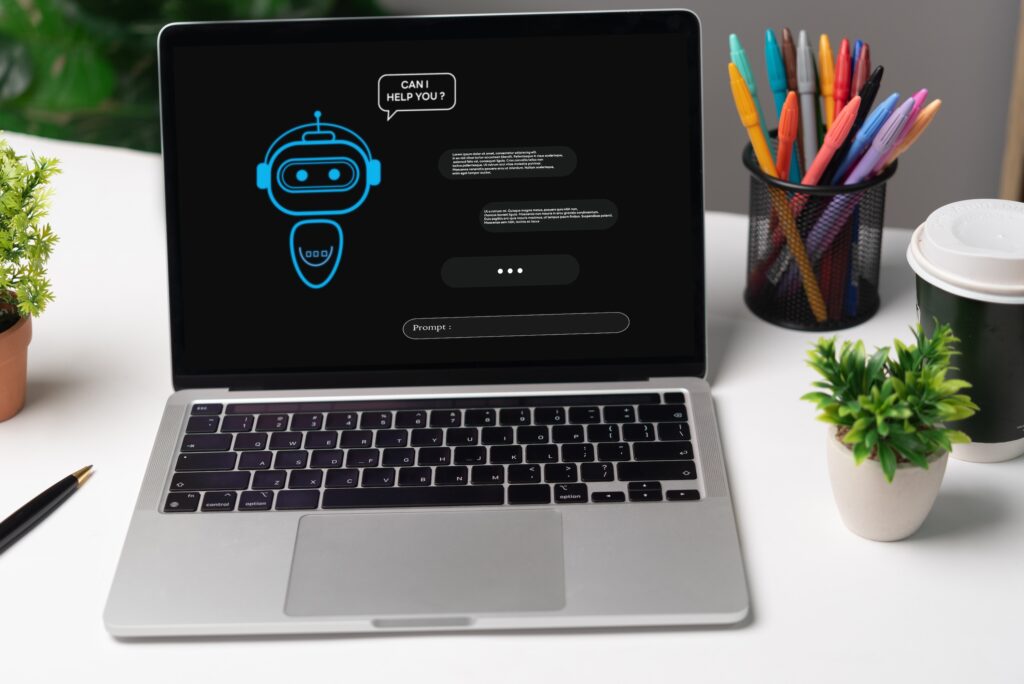If you’re anything like us, you’re always on the lookout for the next B2B sales tool that will make your job easier and more efficient. Artificial intelligence (AI) has been around for a bit now, and we’ve touched on its applications in past articles. At this point, we’d be shocked if you hadn’t played around with at least one AI tool.
One of the most exciting things about AI is how quickly it’s evolving and how much new AI for B2B sales technology is coming on the scene every week, if not every day.
With the sheer volume of sales data that your team deals with, AI tools for B2B sales help make sense of it all, offering insights that were once impossible to uncover manually. Today, we’re looking at seven creative ways that B2B sales teams are using AI to drive better, more efficient results.
1. AI-Powered Lead Scoring and Prioritization
One of the biggest hurdles in B2B sales is knowing which leads to pursue. AI solves this problem by analyzing vast datasets to prioritize leads based on predictive behaviors and purchase intent. Machine learning algorithms help sales teams focus on leads that are most likely to convert by evaluating metrics like:
- Web behavior
- Engagement patterns
- Historical sales data
Several popular CRM systems, including HubSpot and Salesforce, incorporate AI-powered lead scoring into their software. This type of feature typically uses machine learning (ML) algorithms to analyze customer data, interactions, and historical conversion information to predict which leads are most likely to convert.
Our Score: 8/10. AI-powered lead scoring is highly impactful for B2B sales because it gives sales teams the insights needed to focus on high-potential leads and streamline outreach efforts. This way, you can minimize time wasted on unqualified leads, with the potential of significantly boosting conversion rates. This type of tool is rarely offered alone, however, so it’s often a better value to pay for an AI-driven CRM or sales platform that incorporates lead scoring as a feature.
2. Personalized Email Outreach with AI-Driven Content Creation
Generic email blasts have largely lost their effectiveness these days. Today’s AI tools analyze vast amounts of data to create highly personalized emails that speak directly to each prospect’s needs and interests. For instance, Autobound.ai uses AI to scan the internet for relevant insights about your prospects, automatically generating personalized content for each email in your sequence. This level of customization has shown to increase email open rates by 26% and response rates by 29%.
To put this into action, consider integrating an AI email assistant with your CRM. This way, you can leverage your existing customer data alongside publicly available information to craft emails that feel like they were written just for the recipient.
Our Score: 9/10. Email personalization offers significant benefits, especially for teams that need to scale their outreach. When used with accurate first-party customer data, sending such personalized content has the potential to significantly increase conversions.
3. AI-Enhanced CRM Systems for Predictive Sales Forecasting
The CRM systems of old are evolving quickly thanks to AI, offering B2B sales teams a new level of predictive sales forecasting. AI-enhanced CRMs like Salesforce Einstein or Zoho CRM AI can automatically predict sales trends and identify high-risk deals by analyzing past sales data, market trends, and customer behavior. These insights help B2B sales teams forecast their pipeline and — even more importantly — also adjust their strategies in real-time.
With LeadLander’s CRM integrations, you can easily analyze and score all of the new leads our website visitor identification platform is identifying for your company. AI-powered CRMs can even suggest the next best action to take with specific leads, helping sales professionals make smarter decisions faster. With forecasting informed by AI, sales teams can optimize their resources and focus efforts and resources where they have the most potential to deliver results.
Our Score: 10/10. AI-enhanced CRM systems are critical for B2B sales success. These platforms’ ability to predict trends and allocate resources effectively can completely transform how sales teams operate, leading to more accurate forecasting and better sales outcomes.
4. AI Chatbots for Lead Nurturing

Depending on the size of your company, AI chatbots can be indispensable tools for B2B sales teams. Large and enterprise companies can especially benefit from the assistance of AI chatbots with early lead nurturing efforts.
These generative AI chatbots help maintain continuous, real-time engagement with prospects. Whether it’s answering frequently asked questions, scheduling meetings, or even capturing leads directly from a website, these AI assistants can handle tasks at scale, freeing up your human sales reps to focus on high-value interactions.
Sendbird’s AI Chatbot feature, for example, can handle initial outreach and also deepen relationships with prospects during the lead nurturing phase by offering personalized responses and guiding potential clients through the sales funnel. AI chatbots can work around the clock, attending to every lead in real time, and maintaining engagement even when your sales team isn’t available.
Our Score: 8/10. AI chatbots can make a notable impact since they can scale engagement and nurture leads 24/7. While they require significant training and resources up front to make them effective, they can be valuable for B2B companies with high lead volumes.
5. Advanced AI Analytics for Sales Performance Optimization
AI tools play a crucial role in offering deeper insights into B2B sales team performance. Advanced AI analytics platforms like Gong.io and InsightSquared help B2B companies understand what’s happening during every stage of the sales process — from initial outreach to closed deals. These platforms assist with:
- Analyzing win-loss ratios
- Tracking and analyzing customer interactions
- Providing actionable insights on how sales teams can refine their strategies
For instance, Gong uses AI to break down sales conversations, analyzing factors like talk-to-listen ratios, sentiment, and call structure. This helps sales teams identify patterns that contribute to successful deals and pinpoint areas for improvement.
InsightSquared, on the other hand, offers AI-powered analytics and forecasting capabilities. Its 350 pre-built reports and predictive analytics features allow sales teams to analyze various aspects of their sales pipeline, from the predicted value of an opportunity to projected monthly bookings.
Our Score: 7/10. AI analytics platforms can help teams significantly optimize sales strategies, but they can be costly. If accurate forecasting and analyzing buyer behavior are a priority, these tools can be extremely beneficial.
6. AI in Negotiation Support and Dynamic Pricing
Negotiating deals can be complex, but AI for B2B sales simplifies the process by offering real-time assistance in deal negotiations and pricing strategies. Advanced AI tools are changing how sales teams approach pricing and negotiations, leading to more favorable outcomes and increased efficiency.
First, let’s look at AI-powered negotiation support. Platforms like Icertis NegotiateAI and Pactum are at the forefront of AI-assisted negotiations. Icertis NegotiateAI integrates with Microsoft Word and allows sales teams to analyze contracts, find similar clauses across the organization’s contract repository, and suggest improvements based on historical data and best practices.
Pactum, specifically designed for large enterprises, uses autonomous AI to conduct negotiations at scale, which is particularly effective for non-strategic supplier contracts with large dollar values. It can simultaneously manage thousands of negotiations, finding optimal deals that benefit both parties.
These tools help sales teams by:
- Analyzing past negotiations to identify successful strategies
- Providing real-time suggestions during live negotiations
- Automating parts of the negotiation process for routine deals
AI is also transforming pricing strategies through dynamic pricing models. Tools like Competera offer sophisticated AI-driven pricing solutions based on multiple factors like seasonality, competitor actions, and inventory levels.
These platforms enable sales teams to:
- Adjust prices automatically based on market conditions
- Personalize pricing for individual customers or segments
- Predict the impact of price changes on demand and revenue
Impact Ranking: 8/10. AI negotiation and pricing tools are highly impactful but work best in environments with complex or dynamic pricing needs, and are typically designed and priced for larger companies. They help close deals faster and more favorably but may offer less direct benefit to teams dealing with fixed or standardized pricing structures.
7. Virtual Product Demonstrations

Virtual product demonstrations powered by AI are emerging as another effective tool for B2B sales teams. These tools make it easier to showcase large, complex, or location-specific products without the logistical challenges.
Thanks to Augmented Reality (AR) and Virtual Reality (VR) technologies, sales teams can now offer immersive product experiences that overcome physical limitations. Some popular AR and VR tools include:
- Enhance XR: This platform allows businesses to create interactive 3D product demonstrations that can be viewed in AR or VR, providing a highly engaging experience for potential buyers that they can experience through their smartphone.
- Google ARCore: While primarily known for consumer applications, Google’s AR development platform is increasingly being used for B2B product demonstrations, offering a wide reach due to its compatibility with many Android devices.
Studies show that AR product experiences are 200% more engaging for buyers, which can significantly influence decision-making processes. These AI-driven tools help sales teams:
- Showcase products in their full glory, regardless of size or location
- Provide interactive, hands-on experiences that traditional demos can’t match
- Significantly speed up the sales cycle
- Enhance customer engagement and understanding of complex products
Impact Ranking: 7/10. While virtual product demos offer powerful sales experiences, their impact and ROI can vary based on the industry, and they are best suited for product-based sales.
Change Things Up with Innovative AI for B2B Sales
AI tools continue to reshape how B2B sales teams operate. From improving lead scoring and personalizing email outreach to optimizing pricing strategies and transforming product demonstrations, this technology enables sales reps to work smarter, not harder.
When you connect AI sales tools with LeadLander’s powerful website visitor tracking software and ever-expanding database, you can streamline your lead generation and sales process, giving your team the edge it needs to succeed.
